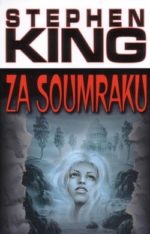It wasn’t just novels. In the early 2000s, Stephen King seemed existentially exhausted. He’d started the decade with two books about the limitations and failures of storytelling (From a Buick 8 and The Colorado Kid), gone back into the hospital for surgery still dealing with his 1999 accident, emerged with memory problems, then turned in one of his least popular novels (Cell), before getting his groove back with Lisey’s Story and Duma Key in 2006 and 2008. During that low point, he’d also turned in one of his least interesting short story collections, Everything’s Eventual, which felt like it was mostly made up of recycled ideas. There were some good stories in there, but the ones that just lay there, barely breathing, far outnumbered them.
But in 2006, King edited the 2007 Best American Short Stories collection and something clicked. Confessing that he’d lost his knack for writing short stories after writing a bunch of long novels in the late Nineties, he said that reading the huge volume of stories required to put together the Best American Short Stories anthology reignited his spark and in 2006 he wrote “Willa”, his breakthrough story. It felt like the old days to him again, and inspired by his rejuvenated mojo, he powered through the rest of the stories in this volume, which turned out to be King’s most satisfying short story collection since Skeleton Crew.
Originally titled Pocket Rockets, then Unnatural Acts of Human Intercourse, King said his publisher had a “shit fit” and demanded that the title be changed. They compromised with Just After Sunset, which at least fit in with his previous time-focused short story collections (Everything’s Eventual, Four Past Midnight, Night Shift). The stories in this book were mostly written after “Willa” which was first published in December, 2006. With 13 stories in the collection, and taking out “The Cat From Hell” which is an old story he republished, as well as the four written pre-2006, that leaves us with eight stories written post-“Willa”. Written between 2006 and March, 2008, that’s eight stories in about two years, which is one every three months, while he was also writing his novels. It seems that his short story mojo was back…and it was hungry.
 “Willa” December, 2006, Playboy
“Willa” December, 2006, Playboy
A train station where the passengers from a canceled train are waiting. A country bar that feels like something out of Carnival of Souls. A guy looking for his girlfriend, who seems to have some definite opinions on where they really are. To say more would ruin it, but after wading through Everything’s Eventual and Lisey’s Story, this is a cup of cool water. Like Shaker furniture, it’s well-balanced, it holds its cards tight to its chest, and it’s beautiful in its plain craftsmanship. There’s no fever swamp of made-up words, a la Lisey. Just a story that keeps revealing more and more of itself as it unfolds. All about love and death, it would have fit perfectly in at the New Yorker.
“Gingerbread Girl” July, 2007, Esquire
Very similar to Duma Key, this is the story of a traumatized woman who ditches her marriage and heads to Florida, where she takes up residence on a key connected to the mainland by a single drawbridge. Every day, she works out her emotional issues by running on the beach and through the streets around the always-empty vacation homes, until one day she sees a car in the driveway of one house with a corpse hanging out of its trunk. King has several different flavors of short story, and I like to call these his Hitchcocks. Set in the real world, displaying their subtexts in neon colors for everyone to see, they’re straightforward studies in suspense, like a good episode of Alfred Hitchcock Presents. Other Hitchcocks include “The Ledge” and “Quitters Inc.” from Night Shift, as well as “Survivor Type” from Skeleton Crew, and “A Very Tight Place” also from this collection. I love these stories, and this is just as good as the rest.
 “Harvey’s Dream” June, 2003, New Yorker
“Harvey’s Dream” June, 2003, New Yorker
King had his main character in Gerald’s Game refer to herself as “the amazing Gingerbread Girl” and another of his obsessive phrases echoes through “Harvey’s Dream” with its mention of the Wallace Stevens poem “The Emperor of Ice Cream”, something he’s been giving shout-outs to ever since ‘Salem’s Lot. In a lot of horror novels, characters have a “strange feeling” or a “feeling of evil” which is often just lazy shorthand the author deploys to avoid having to build their fear out of concrete details. In a strange way, this entire dreamlike story is about that “strange feeling” and in a few brief pages it weaves an ominous, oppressive, almost inhuman mood. It’s no surprise that the entire story came to King in a dream and he woke up and wrote it, or rather transcribed it, in one sitting.
“Rest Stop” December, 2003, Esquire
King is fascinated by Donald E. Westlake who wrote his Parker novels under the Richard Stark name, and the Ed McBain/Evan Hunter split. He dedicated The Dark Half to exploring the relationship between a writer and his pseudonym, and he returns to that territory here. Set in Florida, John Dykstra writes a series of hardass crime novels under the Rick Hardin name. When he stops at a rest stop on the way back from a signing and hears a guy abusing his wife in one of the bathrooms, Dykstra wants to run away, but when he pretends that he’s Hardin he’s able to exact vengeance. King always wanted a separate literary identity he could use to write tough guy fiction, but his Richard Bachman pen name was taken from him by his own fame. And it’s too bad. Bachman had a real style, so imagine how much better King’s Mr. Mercedes books would have been if they’d been written by Bachman instead of King.
 “Stationary Bike” 2003, Borderlands
“Stationary Bike” 2003, Borderlands
Back in 1983, King wrote “Word Processor of the Gods” about an author whose magic computer made whatever he typed become real. Ever since then, he’s explored the idea of imaginary creations coming to life in The Dark Half and The Regulators, among others. In this story, a commercial artist trying to get his cholesterol down begins riding a stationary bike in his basement, then paints a picture on the wall of the imaginary countryside he’s riding through, visualizing workers keeping his arteries unclogged. Of course, these things turn real, with horror-y results. It’s a bit on the long side, and King’s been here before, but it’s still written in the simple, straightforward style that typifies the stories in this collection, and it’s all the better for that. Also of note is the fact that it’s yet another story, like Duma Key and “The Gingerbread Girl”, of someone exercising themselves back to health and sanity, much in the same way King did himself after his 1999 accident which wasn’t even ten years gone at this point.
“The Things They Left Behind” 2005, Transgressions: vol. 2
A very on-the-nose 9/11 story, it’s probably no mistake that the title echoes Tim O’Brien’s poignant Vietnam novel, The Things They Carried. One year after the World Trade Center goes down a guy who played hooky from work that day begins to find his dead colleagues’ cubicle toys materializing in his apartment. Full of too many small details that feel slightly off (what office used Zip discs in 2001? A character stays in bed listening to the news reports of 9/11 “until the sun comes up” even though first impact was 8:46am) to totally ring true, some of that may be because this is his first story in a long time in which King’s character works in an office (most of his characters work freelance, like him). At the same time, it’s as well-written as any other story in this collection and winds up being pretty effective, quibbling aside.
 “Graduation Afternoon” March, 2007, Postscripts
“Graduation Afternoon” March, 2007, Postscripts
King had been prescribed Doxepin, an antidepressant and sleep aid, but felt like he was coming to rely on it. In November, 2006, while promoting Lisey’s Story in London, he decided to go cold turkey and the result was a week of incredibly vivid dreams. One of the things he saw was an enormous mushroom cloud rising over New York City, and he woke up in a sweat, sat down, and wrote this brief, effective story. Like “Harvey’s Dream” it creates a slightly off-kilter, druggy mood that’s ominous and effective. It also deploys one of his threadbare tics, when King signals the simple virtue of the main character from the wrong side of the tracks by telling us that no one at her rich boyfriend’s house ever plays “the country stuff Janice grew up with.” For King, those who listen to country music are salt of the earth, and it provides the soundtrack for “Willa” and the Dixie Chicks get an admiring shout out in “The Things They Left Behind.” Clearly, if you wanted to get on King’s good side in 2008, blast a little Waylon Jennings.
“N.” previously unpublished
Not since Night Shift‘s Lovecraft pastiche “Jerusalem’s Lot” has King felt like he’s imitating an earlier tradition of horror tale the way he does with N. Another epistolary story, that feels like it owes a debt to Lovecraft’s tales of interdimensional evil intruding into our plane of existence, King says that it’s an homage to Arthur Machen’s “The Great God Pan” a story he’s cited as being influential several times before. Whether it’s Lovecraft or Machen, there’s a feeling that the main characters, who become self-destructively obsessed with a stone circle in a remote field, are playthings at the mercy of inhuman forces. Since his accident, King himself had been at the mercy of these same inhuman forces, called addiction and pain, and he writes what could have been empty homage with a lot of conviction. Also, along with “A Very Tight Place” it deals with mental illness, in this case Obsessive Compulsive Disorder. A series of 25 graphic video shorts (running about 90 seconds each) were created based on N. to promote this collection and they were later collected on a DVD. Marvel Comics also released a mini-series based on “N”.
 “Cat From Hell” June, 1977, Cavalier
“Cat From Hell” June, 1977, Cavalier
An old story published at the beginning of King’s career but never included in any of his anthologies, the slight “Cat From Hell” is dusted off and finally finds its way into an official King collection. About a hitman hired to kill an evil housecat, it’s as meaty and fun as an old EC Comics yarn, and it’s pretty lively for a story that takes place entirely in two chairs: an armchair in an old library, and the driver’s seat of a car.
“The New York Times at Special Bargain Rates” Oct/Nov, 2008, Magazine of Fantasy & Science Fiction
Written quickly while he was adjusting to jet lag after arriving in Australia for a motorcycle trip and unable to sleep, this is another short, vivid story but it’s drenched in afternoon sunlight and rationality rather than the moody, surreal, early morning obscurity of “Harvey’s Dream” or the late afternoon twilight of “Graduation Afternoon.” A woman planning her husband’s funeral answers the phone and finds that her deceased partner is on the other end of the call. Better at the secret, intimate language of marriage than all of Lisey’s Story put together, it’s a gentle story that elicits genuine tears. Like “Willa” and “The Things They Left Behind” it’s another story about sudden death, and you wonder what was on King’s mind to elicit so many stories written between 2006 and 2008 about unexpected fatal accidents.
“Mute” December, 2007, Playboy
Another one of King’s Hitchcocks, this one also includes some ponderings about marriage in a short, inconsequential tale of a guy who picks up a deaf mute hitchhiker and decides that his captive audience makes a perfect person he can vent to. Duh-DUM: the guy isn’t really deaf! And now, death follows! There’s a sting in the tail of this story which feels also like an Old Time Radio play from Inner Sanctum or Suspense. Perfectly well done, but one of this volume’s weaker stories.
 “Ayana” Fall, 2007, Paris Review
“Ayana” Fall, 2007, Paris Review
King’s always been preoccupied by dying, and some of his most beautiful short stories have been about death coming gently (“The Woman in the Room”, “The Reach”) and this is another one. It’s slight, and slim, but still nicely done.
“A Very Tight Place” May, 2008, McSweeney’s
Another of King’s Hitchcocks, this one’s all gross-out. A feuding neighbor finds his nemesis trying to exact revenge by locking him in a Porta-Potty, there to starve to death. Instead, he crawls through the toilet, swims through all the poop, and makes it out the bottom. It exerts a kind of disgusting fascination, and also features another mentally ill protagonist, this one struggling with depression and bulimia.
One of the most remarkable things about this collection is that while writing a lot of these stories, King was also in the middle of writing his massive, epic-sized, thunder-lizard of a novel, Under the Dome, which is distinguished by the same clear, straightforward prose that characterizes almost all the stories in this collection. After the baroque style of Lisey’s Story and the interiority of Duma Key, much of which was concerned with the inner monologue of the creation process, this is a new, stripped-down King, whose writing almost feels minimalist. For King that is. After all, Under the Dome may be minimalist, but it’s also 1,074 pages.
 Grady Hendrix has written for publications ranging from Playboy to World Literature Today; his previous novel was Horrorstör, about a haunted IKEA, and his latest novel, My Best Friend’s Exorcism, is basically Beaches meets The Exorcist.
Grady Hendrix has written for publications ranging from Playboy to World Literature Today; his previous novel was Horrorstör, about a haunted IKEA, and his latest novel, My Best Friend’s Exorcism, is basically Beaches meets The Exorcist.










